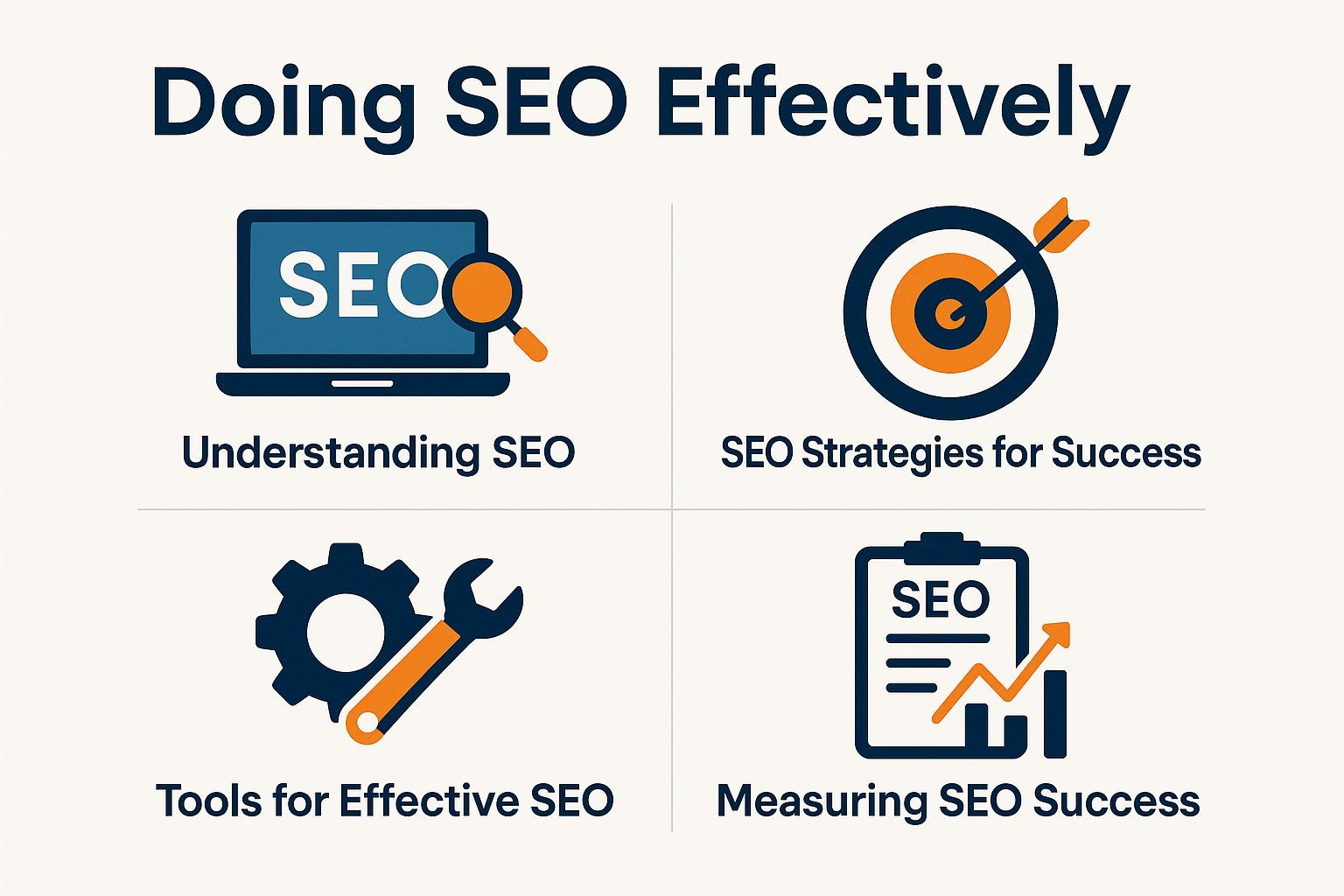
In today’s digital landscape, mastering Search Engine Optimization (SEO) is essential for individuals and organizations seeking to enhance their online presence. This article elucidates the fundamentals of SEO, addressing its significance and the strategies that can elevate a website’s performance. Key tactics for success will be examined, including effective keyword research, the creation of quality content, and the development of valuable backlinks. Additionally, the most effective tools for optimizing SEO efforts and methods for measuring success will be discussed. Prepare to uncover the principles of effective SEO.
Understanding SEO In Panama City
A comprehensive understanding of SEO, or search engine optimization, is essential for any digital marketing strategy focused on improving online visibility and attracting organic traffic.
SEO comprises various techniques, including on-page SEO, off-page SEO, technical SEO, and schema markup, each of which plays a crucial role in how search engines, such as Google, index and rank websites.
As the digital landscape continues to evolve, it is imperative for businesses to comprehend the complexities of SEO in order to enhance their website authority and remain compliant with the latest Google algorithm updates, ultimately resulting in improved search visibility and higher domain authority.
Voixly does a great job of explaining how SEO works.
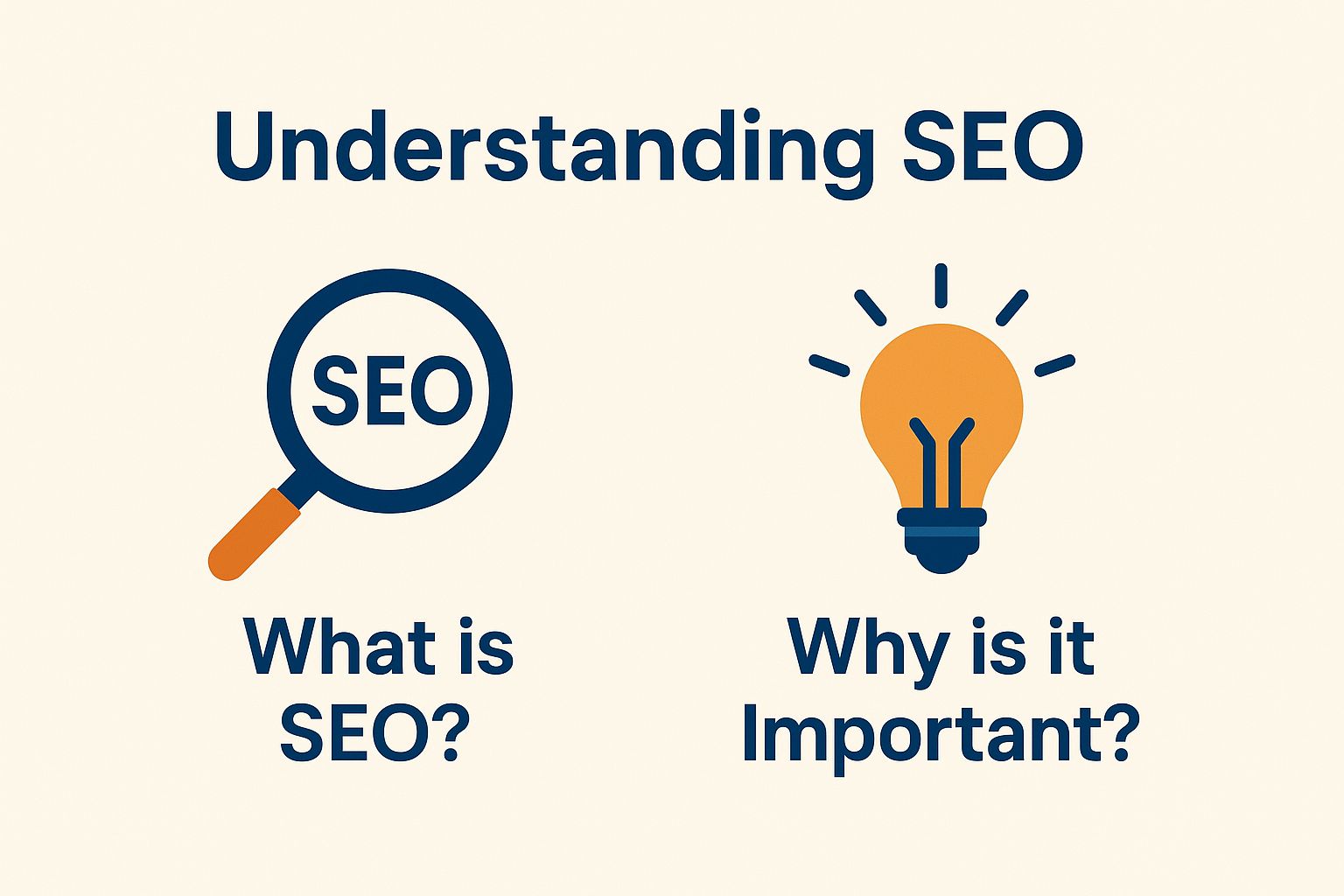
What is SEO?
Search engine optimization, commonly referred to as SEO, encompasses a range of strategies and techniques aimed at enhancing a website’s visibility within search engine results pages (SERPs) to attract organic traffic. This process involves a comprehensive understanding of user intent, content optimization, and the implementation of various ranking factors to ensure that a website is prominently displayed for relevant search queries.
The intricate nature of SEO includes several critical components, such as keyword research, content optimization, on-page optimization, technical SEO, and link building.
By effectively identifying and integrating pertinent keywords, a business can align its content with the interests of potential customers. For example, a website specializing in handmade candles may utilize keywords such as “natural soy candles” or “eco-friendly home fragrances” to attract users seeking sustainable products.
Successful SEO practices also encompass the optimization of website attributes such as fast loading times, mobile-friendliness, and the acquisition of high-quality backlinks. These elements collectively contribute to an enhanced user experience and improved search rankings. If you want help with any of this, you can use this SEO company in Panama City.
Why is it Important?
Search Engine Optimization (SEO) in Panama City is essential for businesses seeking to enhance their online presence, as it has a direct impact on website rankings in search results. By improving these rankings, businesses can attract a greater volume of organic traffic and potential customers.
Implementing effective SEO strategies results in increased visibility, higher click-through rates (CTR), and ultimately improved conversion rates, making it a fundamental element of digital marketing and enabling successful keyword density and anchor text optimization.
In today’s competitive environment, businesses can leverage the power of SEO not only to enhance visibility but also to gain a competitive edge. Through comprehensive competitive analysis, organizations can identify market gaps and optimize their content accordingly.
This strategic approach enables them to surpass competitors by targeting specific keywords that resonate with their audience, thereby capturing and retaining customer attention. Ultimately, the application of effective SEO practices fosters long-term business success and significantly enhances brand reputation, contributing to sustained growth and profitability.
SEO Strategies for Success
To achieve success in search engine optimization (SEO), businesses must implement a comprehensive set of strategies that encompass various facets of the discipline, including keyword research, content marketing, and the development of high-quality backlinks.
By prioritizing user engagement and optimizing each component of their online presence, businesses can significantly enhance their website’s authority, ranking factors, and visibility in search engine results.
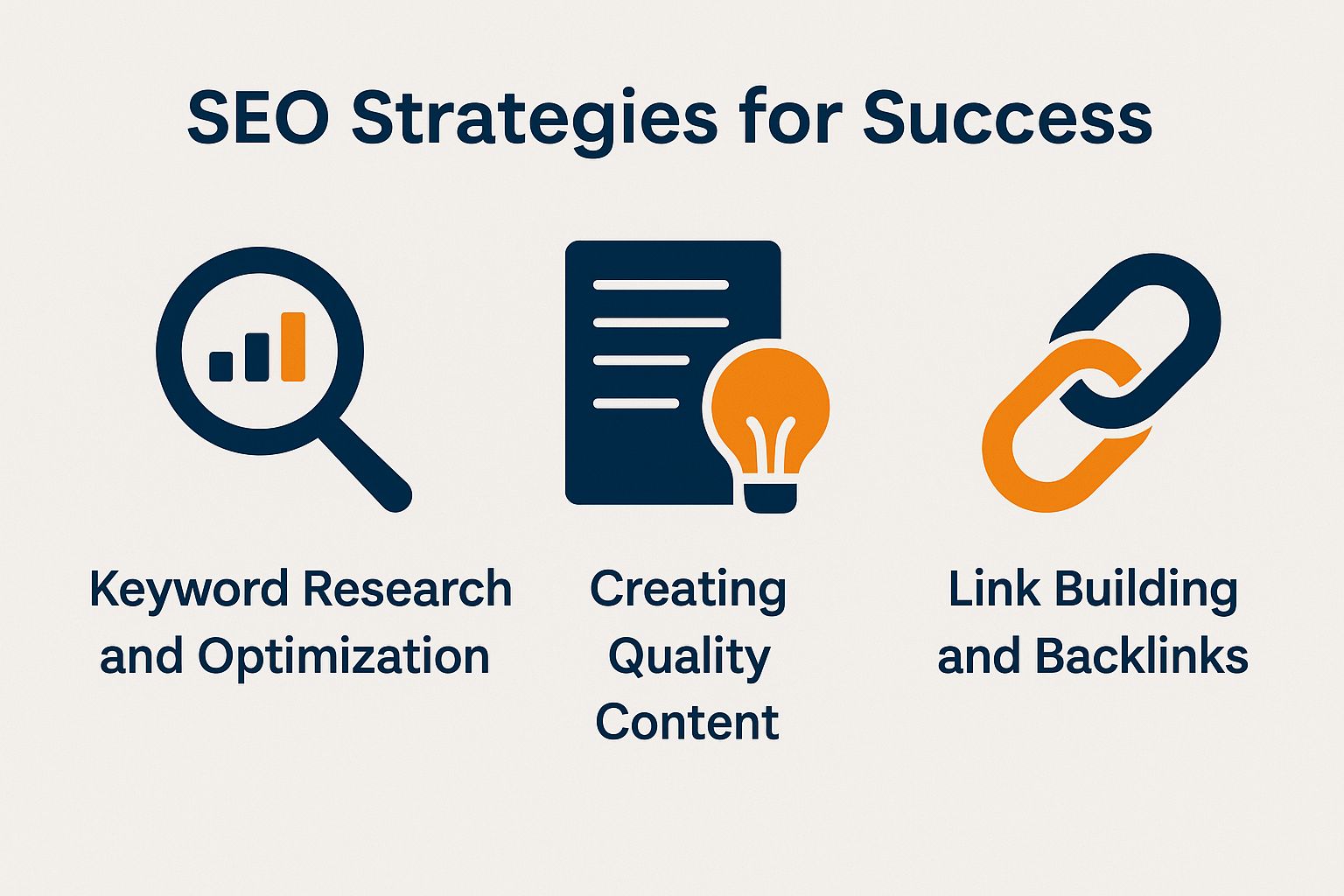
Keyword Research and Optimization
Keyword research and optimization are essential elements of any effective SEO strategy, allowing marketers to identify relevant search terms and phrases, including long-tail keywords that address specific user intents.
Through the analysis of keyword density and the utilization of specialized SEO tools, businesses can strategically position their content to enhance rankings and effectively reach their target audience.
To initiate this process, marketers typically employ tools such as Google Keyword Planner, SEMrush, or Ahrefs, which offer valuable insights into search volume, competition, and related keywords.
Long-tail keywords, which are typically composed of three or more words, hold particular significance as they often exhibit lower competition and higher conversion potential. For example, rather than targeting a broad term like “shoes,” concentrating on “best running shoes for flat feet” can draw a more specific audience with a clear intent to purchase.
Maintaining an optimal keyword density, generally around 1-2%, is crucial to ensuring that content remains engaging and relevant while avoiding penalties for keyword stuffing. This practice ultimately contributes to improved search engine rankings.
Creating Quality Content
Creating quality content is fundamental for effective content marketing and SEO, as it not only attracts visitors but also enhances user engagement and encourages repeat visits. By implementing a well-defined content strategy and emphasizing content optimization, businesses can ensure that their materials resonate with their audience while adhering to SEO best practices.
To achieve this, it is essential for marketers to prioritize content freshness, as regularly updated material keeps the audience informed and engaged. Relevance is also a critical factor; content must align with the evolving needs and preferences of the target demographic.
Strategies such as conducting audience research, utilizing analytics to monitor engagement, and incorporating feedback can significantly contribute to the development of a robust content marketing plan.
By applying these principles, brands can craft compelling narratives that cultivate a loyal readership, drive traffic, and ultimately lead to increased conversions. If you need Panama City SEO done, just reach out to one of our reps.
Link Building and Backlinks
Link building is an essential component of SEO, involving the acquisition of backlinks from reputable websites to enhance a site’s authority and improve its ranking in search engine results. By cultivating relationships and implementing effective external linking strategies, businesses can significantly enhance their online credibility and boost overall SEO performance.
The importance of link building goes beyond merely increasing website traffic; it is crucial for establishing trustworthiness, page authority, and relevance within a competitive digital landscape.
Various strategies can be employed to acquire valuable links, including:
- Guest blogging
- Outreach campaigns
- Leveraging content marketing to create shareable assets
Understanding the concept of website authority is vital, as higher authority sites impart greater value to the linked pages, consequently improving search engine rankings.
To evaluate the success of link building efforts, one may track metrics such as organic traffic growth, referral traffic from backlinks, and enhancements in domain authority, thereby gaining clear insights into the effectiveness of their link-building strategy.
Tools for Effective SEO
The utilization of appropriate tools is crucial for effective SEO, as these tools offer valuable insights into analytics, keyword research, and traffic analysis.
By leveraging advanced SEO tools, marketers can enhance their optimization efforts, monitor performance metrics, and systematically refine their strategies to achieve improved search visibility.
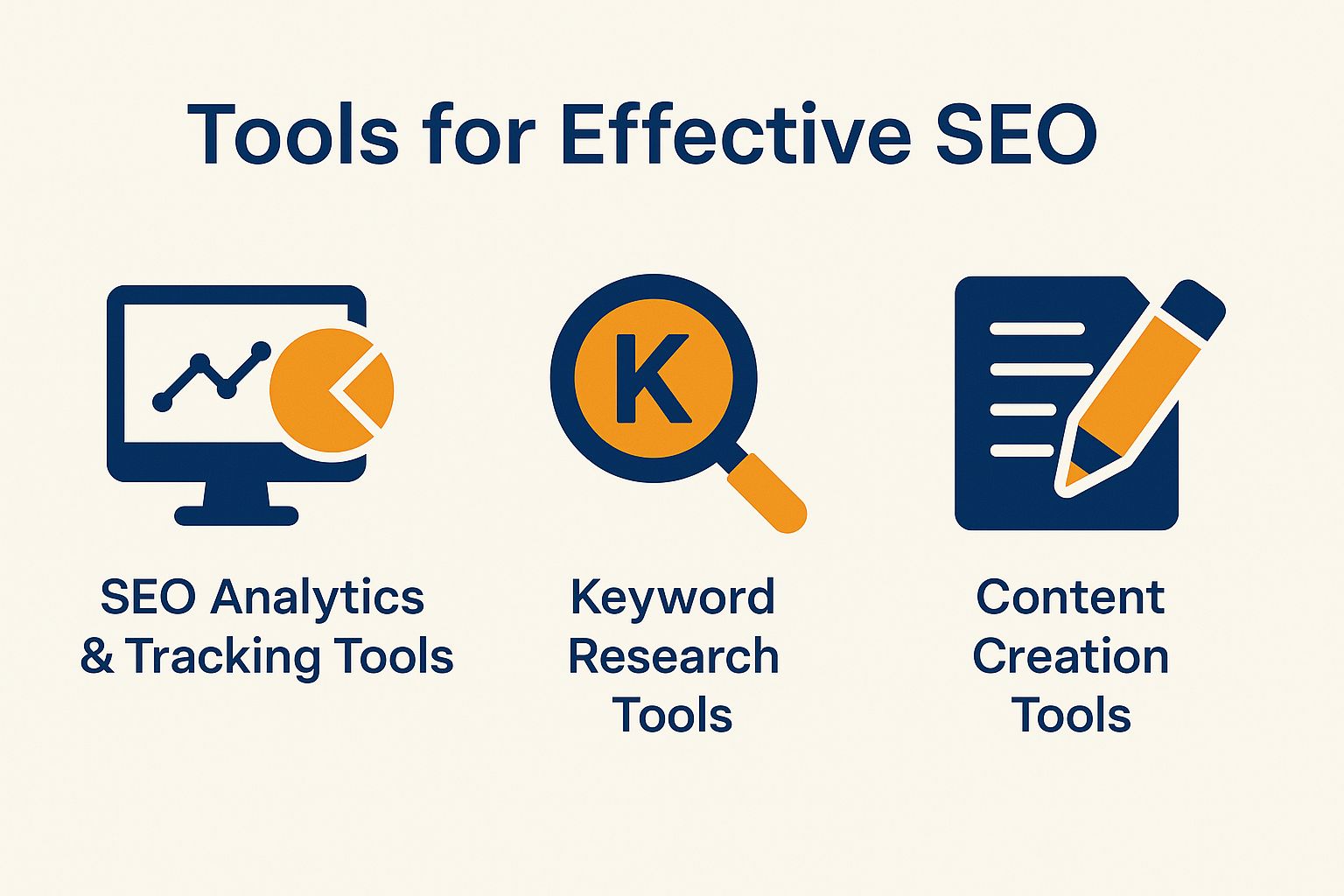
SEO Analytics and Tracking Tools
SEO analytics and tracking tools, such as Google Search Console, are essential for monitoring website performance metrics and conducting thorough SEO audits. These tools enable marketers to identify areas for improvement, track organic traffic, and gain insights into user behavior, thereby informing ongoing optimization efforts.
By utilizing these tools, the assessment of key performance indicators, including page load speed, click-through rates, and bounce rates, becomes more manageable. Understanding these metrics is crucial, as they have a direct impact on user experience and search engine ranking.
For example, a high bounce rate may suggest that the content is not resonating with visitors, indicating a need for strategic adjustments. Leveraging analytics can uncover valuable insights regarding keyword performance, backlink quality, and site usability, ultimately guiding the overall SEO strategy to enhance visibility and engagement.
Keyword Research Tools
Keyword research tools, such as Google’s Keyword Planner, are essential for identifying search trends and conducting competitive analysis within the field of SEO. These tools enable marketers to discover relevant keywords, evaluate their competition, and refine their content strategy for optimal outcomes.
Along with Google’s offering, other notable options such as SEMrush and Ahrefs provide comprehensive data that goes beyond mere keyword suggestions. For example, SEMrush delivers insights into keyword difficulty and search volume, while Ahrefs excels in analyzing backlink profiles and identifying top-ranking pages.
By utilizing SEO tools and these features, users can pinpoint content gaps or areas conducive to growth. Understanding the data presented by these tools is vital, as it informs the development of targeted SEO strategies, enabling brands to shape their online presence in accordance with actual search behaviors and trends.
Interpreting keyword intent can further assist in crafting content that resonates effectively with audience personas, ultimately driving organic traffic and enhancing conversion rates.
Content Creation Tools for SEO Strategies
Content creation tools play a critical role in enhancing content quality and optimization of digital content, ensuring alignment with SEO performance metrics. By leveraging these tools, marketers are able to develop compelling content that not only captivates readers but also adheres to established SEO best practices.
These resources, which include keyword research applications and content planning platforms, enable creators to effortlessly identify trending topics and relevant keywords like short-tail keywords, integrating them naturally into their narratives.
Additionally, they offer valuable insights into audience preferences and behaviors, ensuring that the produced content resonates effectively with the target audience.
Maintaining high-quality content transcends merely populating a page with text; it involves the creation of valuable, informative, and engaging material including evergreen content.
By prioritizing these aspects, marketers can enhance visibility in search engine rankings, drive organic traffic, and ultimately improve conversion rates, thereby achieving a balanced approach to quality and optimization in their digital strategies.
Measuring SEO Success with SEO Audits
Measuring the success of SEO initiatives necessitates the evaluation of key metrics that indicate the effectiveness of optimization efforts, including engagement metrics like dwell time.
Important metrics include:
- Organic traffic
- Bounce rate
- Conversion rate
By comprehensively analyzing these SEO performance indicators, businesses can effectively assess their strategies and make informed, data-driven decisions to enhance future outcomes.
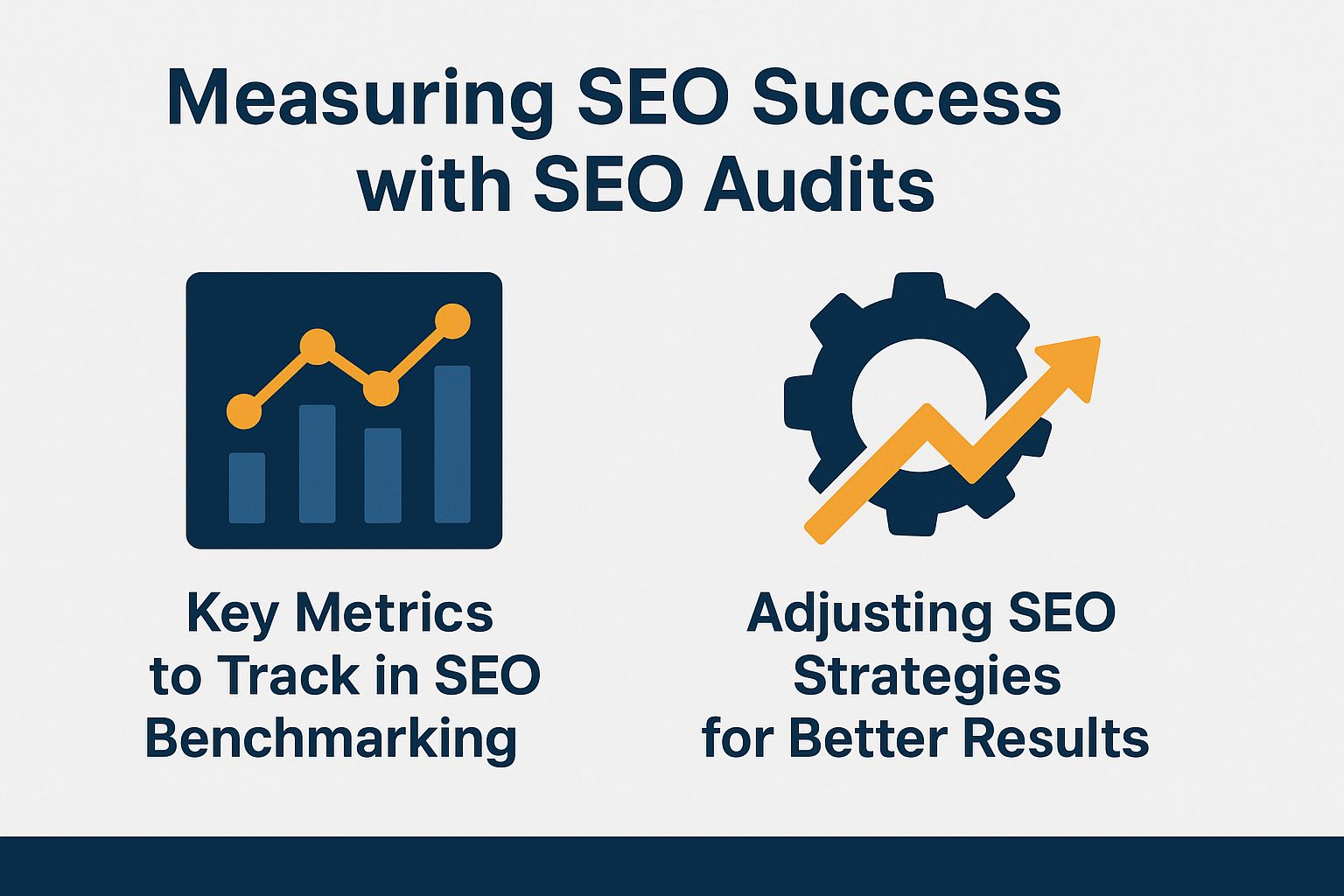
Key Metrics to Track in SEO Benchmarking
When measuring the success of SEO initiatives, it is essential to track key metrics that include user engagement, organic traffic, keyword rankings, and social signals.
By utilizing analytics to monitor these metrics, businesses can obtain valuable insights into user behavior and the effectiveness of their SEO strategies.
Along with these fundamental indicators, it is imperative to consider other factors such as bounce rates, conversion rates, backlinks, and site maps.
Bounce rates provide insight into how effectively content retains visitors, while conversion rates reflect the percentage of users who complete desired actions, such as signing up or making a purchase, which is critical for evaluating overall effectiveness.
Backlinks serve as a testament to the credibility and brand authority of a website, significantly impacting its search engine rankings.
By analyzing these specific metrics, companies can refine their strategies to enhance performance, ultimately leading to a more robust online presence and maximizing return on investment (ROI) through effective URL structure and meta tags.
Adjusting SEO Strategies for Better Results
Adjusting strategies based on SEO performance data is essential for continuous improvement in digital marketing efforts including local SEO and niche marketing.
By thoroughly analyzing analytics and understanding the outcomes of their initiatives, businesses can refine their content optimization strategies and enhance overall SEO effectiveness.
This iterative process commences with the establishment of clear performance metrics, enabling marketers to monitor key indicators such as organic traffic, bounce rates, and conversion rates using SEO checklist.
As trends and user behavior evolve, it becomes imperative to regularly re-evaluate these metrics.
By interpreting data effectively, companies can gain valuable insights into which keywords resonate with their audience and drive engagement through voice search and video SEO.
Adaptability involves making timely adjustments, whether by updating existing content with A/B testing, tailoring new campaigns, or optimally structuring websites for better site hierarchy to enhance user experience.
In this dynamic landscape, remaining responsive to performance data is not merely a strategy; it is a necessity for achieving long-term success.
.jpg_00.jpeg)
.jpg_01.jpeg)
.jpg_10.jpeg)
.jpg_11.jpeg)
 Prospecting and sales funnels are a marketing tool. It represents the ideal path on which you want to place your customers as they move from Prospect to Lead, then to Customer, and finally to Repeat Customer.
Prospecting and sales funnels are a marketing tool. It represents the ideal path on which you want to place your customers as they move from Prospect to Lead, then to Customer, and finally to Repeat Customer.